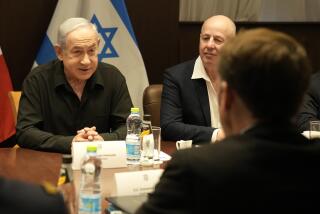Egypt’s Crisis Gives Mubarak a New Image
- Share via
CAIRO — Early this month the winds of trouble were blowing through Egypt. The army was called on to quell the eruption of violence and rioting by elements of the government security forces in Cairo and several other parts of the country.
The crisis underlined the difficulties confronting President Hosni Mubarak’s administration. But the most significant result was that the political system weathered the crisis without damage to its fundamental convictions about democracy and civilian government. In the midst of such a volatile situation, the Mubarak government maintained its stable foundation.
The administration inherited a difficult and complex situation. Egypt is a nation in transition, striving to reconcile differences among domestic forces, to alleviate the economic burdens on an expanding population, to maintain order in the midst of a turbulent region and to pursue a peace process that has been violently opposed by Israelis, Syrians and radical Palestinians.
The internal political scene has been in stalemate as a result of conflicting approaches to domestic and foreign policy advocated by leftists, liberals, adherents of an open-door policy and Muslim fundamentalists.
The economic situation has been stagnating because of the increase in population (1 million annually), the problem of foreign debts and the gradual drying up of sources of foreign currency--oil revenues, remittances of Egyptians working abroad and Suez Canal revenues.
There were fears that these difficult circumstances could be exploited by Muslim fundamentalists or leftists. There was also fear of military intervention and the collapse of civilian government.
To make matters worse, there was an unbalanced security apparatus. The huge expansion of the central security forces in the 1970s was to create a shield against fundamentalists, radical students and other potential sources of political disorder. But this reasoning was flawed. Expanding the police force is not a proper policy toward opposition groups--an inherent weakness exacerbated by over-rapid growth without establishing the requirements of a stable organization. Poorly paid and without any strong political or social commitment, the conscripts in the central security forces were vulnerable to alienation and rebellion.
Both opposition and government officials were feeling the winds of trouble, but neither expected it from the police.
The handling of the crisis, however, revealed the resilence of the Mubarak administration. There are four points worth noting:
--Mubarak moved decisively to reestablish order. His speech to the nation was straightforward and restrained. His visit to the ravaged areas around the pyramids demonstrated his leadership style as “a man of the people.” And he earned the sympathy and respect of public opinion.
--Although there had been some fears that in the event of a crisis the administration would clamp down on the opposition parties and the press, those fears proved to be unfounded. Mubarak met with the opposition leaders during the crisis, which helped establish a feeling of national solidarity, and in a press conference afterward the opposition leaders said that he had been open to their views and advice.
--National television and newspapers accurately covered the crisis, bridging a confidence gap created by their coverage of previous crises. For the first time, Egyptian national radio and television were the most reliable sources of information. The administration thereby earned the respect of public opinion and created a consensus against the rioters.
--Though the government called on the army to restore order, the civilian leadership was in command. The behavior of the army was disciplined and restrained. The crisis proved that the relationship between the army and the civilian leadership is not as precarious as it had been perceived to be. Furthermore, it showed that the threat of military intervention is not an imminent possibility.
It is in the midst of tragic situations and in the throes of crisis that statesmanship proves itself.
The problems of Egypt had left a taint of indecisiveness on Mubarak’s style of leadership. He needed to rebuild the consensus behind his presidency.
This month’s crisis helped achieve that by creating a new image for him--that of an incisive and assertive leader confronting the problems of a pluralistic and heterogeneous society. Now is the time for the Mubarak administration to reassess the past and to move to end the debate on the fundamental issues before the nation. Bold decisions are in order. But one thing has been made clear: Egypt is now too complex and pluralistic a society to be ruled by an authoritarian regime. The process toward democratization is inevitable.
More to Read
Sign up for Essential California
The most important California stories and recommendations in your inbox every morning.
You may occasionally receive promotional content from the Los Angeles Times.













